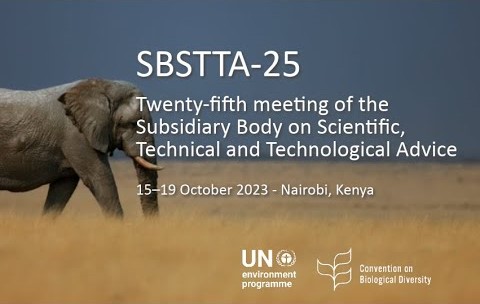25th Meeting of the Subsidiary Body on Scientific, Technical, and Technological Advice (SBSTTA 25) and the Resumed Second Part of the 15th Meeting of the Conference of the Parties to the Convention on Biological Diversity (COP 15) | Nairobi, 15 – 20 October 2023

Related topics
Nature and biodiversity Directorate-General for Environment News article environmental protection Nature and biodiversitydate: 28/01/2024
Summary of SBSTTA-25
Ten months after the adoption of the Kunming-Montreal Global Biodiversity Framework (GBF), the 25th Meeting of the Subsidiary Body on Scientific, Technical, and Technological Advice (SBSTTA 25) of the Convention on Biological Diversity (CBD) convened in Nairobi to provide crucial expert advice on the scientific, technical, and technological aspects of GBF implementation.
The week-long meeting drew over 700 delegates from governments, civil society, and other stakeholder groups, marking the first gathering since the GBF's adoption.
SBSTTA 25 addressed various facets of GBF implementation, placing particular emphasis on the crosscutting issues of climate change and invasive alien species, identified as primary drivers of biodiversity loss.
In response to compelling findings from the Intergovernmental Science-Policy Platform on Biodiversity and Ecosystem Services (IPBES) and the Sixth Assessment Report of the Intergovernmental Panel on Climate Change (IPCC AR6), the meeting emphasised the need for synergistic strategies to address these interconnected challenges. Discussions also extended to sustainable wildlife management and fostering collaboration among multilateral environmental agreements.
The CBD received praise for its collaboration history, including partnerships with conventions such as the Convention on International Trade in Endangered Species of Wild Fauna and Flora (CITES) and the Convention on Wetlands. Delegates highlighted the importance of harnessing collective expertise to streamline and strengthen GBF implementation actions.
Scientific breakthroughs were highlighted as essential for bridging the science-policy interface, recognising the significance of indigenous and local knowledge. The imperative of breaking barriers among multilateral environmental agreements for a comprehensive approach in GBF implementation was underscored.
At the conclusion of SBSTTA 25, eight resolutions were adopted addressing key areas such as plant conservation, invasive alien species, sustainable wildlife management, and the monitoring framework for the GBF agreed in decision 15/5.
In fact, key discussions at SBSTTA 25 centred around developing the GBF's monitoring framework, with a focus on transparent and accountable headline indicators. Governments asked the Ad Hoc Technical Expert Group dealing with the indicators to continue its work and provide results to the 26th meeting of SBSTTA, scheduled for next year.
The meeting also saw the end of SBSTTA Chair Hesiquio Benítez Díaz's five-year tenure, celebrated for his unwavering commitment.
Summary of CBD COP 15
The historic CBD COP 15, spanning over two years, overcame challenges posed by the COVID-19 pandemic and geopolitical tensions. Notably, it set a record as the longest meeting in the history of the Convention. The resumed session in Nairobi addressed unresolved matters, including the election of new officers and the venue for CBD COP 16.
At the resumed 15th meeting of the Conference of the Parties (COP) under the Convention on Biological Diversity, delegates concluded discussions by conducting elections and deliberating on the date and venue for COP 16. The elections included the appointment of chairpersons for subsidiary bodies and the Bureau, marking the end of the resumed session of COP 15 and the COP-MOPs of the Cartagena and Nagoya protocols.
Governments nominated and elected members to the Bureau for COP 15, with terms extending until the close of COP 16. The elected members include representatives from Eswatini, Algeria, Fiji, Cambodia, Jamaica, Colombia, Switzerland, Luxembourg, Georgia, and the Republic of Moldova.
The date and venue for the next UN Biodiversity Conference, encompassing COP 16, COP-MOP-11, and COP-MOP-5, remain undetermined. Türkiye, originally slated to host the event, withdrew its offer due to force majeure following devastating earthquakes. Discussions are ongoing with potential hosts, and in the absence of a host, the meetings may take place in Montreal, Canada, at the Secretariat's seat.
As the world approaches the 2030 deadline, the need for swift implementation and a shift from bureaucratic processes to expedited actions and resource allocation was emphasised during the CBD meetings. The CBD faces a challenging task in the next twelve months leading up to COP 16, involving a global review of collective progress in GBF implementation.
SBSTTA 25 and CBD COP 15 initiated crucial dialogues and actions, emphasising the tangible path the GBF provides toward ending the global biodiversity crisis. The success of the next twelve months leading up to COP 16 will depend on unwavering dedication and action from all stakeholders involved.
More information:
- Statement by the Acting Executive Secretary of the Convention on Biological Diversity, David Cooper, at the opening plenary session of the twenty-fifth meeting of the Subsidiary Body on Scientific, Technical and Technological Advice
- The closing of SBSTTA-25
- The closing of COP 15
- Press Release: Closing SBSTTA-25
- Press Release: Closing COP 15
- Meeting Documents
- Summary report of the Earth Negotiations Bulletin of the International Institute for Sustainable Development (IISD)
